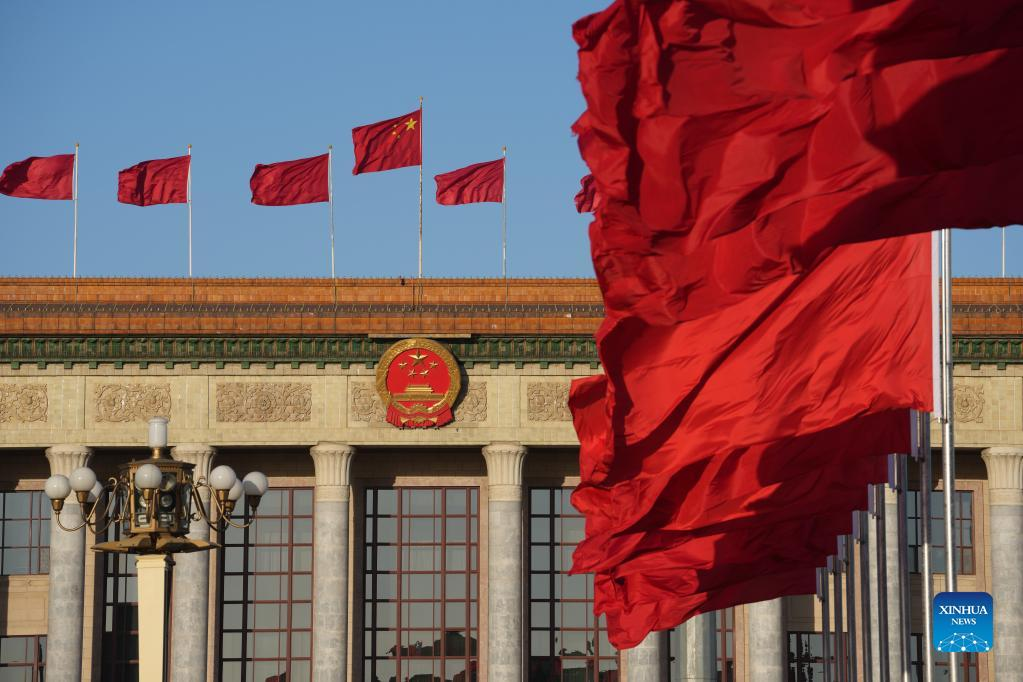Observer says world's eyes on two sessions

Photo taken on March 5, 2022 shows a view of the Great Hall of the People in Beijing, capital of China. [Photo/Xinhua]
Talks on sustainable food security, modern farming of particular interest
China's success in ensuring food security for the world's largest population offers valuable lessons in addressing global food insecurity, especially in Africa, where the situation has worsened during the COVID-19 pandemic, said a senior Kenyan researcher ahead of the two sessions, the annual meetings of China's top legislative and political advisory body.
As the world's second-largest economy and the only major economy to have achieved significant growth during the pandemic, China is again a focus of global attention with the opening of the sessions, at which topics of national significance ranging from agriculture, education and health to diplomacy will be discussed, said Dennis Munene, executive director of the China-Africa Center at the Africa Policy Institute, in Nairobi.
As usual, both bodies have begun their respective sessions by evaluating the progress of the 14th Five-Year Plan (2021-25), and Vision 2035, under which China aims to become a high-income country, Munene said.
"This year's two sessions are key not only to China but also to the rest of the world," he said, adding that many observers are following them closely as China's domestic policies are vital to the post-COVID-19 global economic recovery.
At the top of the policies that Africa and the rest of the world are anticipating is sustainable food security, which has been seriously eroded due to the pandemic's negative impact on hundreds of millions worldwide, he said.
"So the question is how has China, a country of about 1.4 billion people, managed to ensure sustainable food security? These are some of the key policies that the global community will be looking forward to in the two sessions' government reports for post-COVID-19 recovery," Munene said.
Despite global efforts to improve food security, key indicators from the World Food Programme show that the world is not on track to achieve zero hunger by 2030. Further, with the continued impact of COVID-19 pandemic, the number of people estimated to be affected by hunger if stringent measures are not undertaken, will surpass 840 million by 2030, and due to growing levels of food insecurity, many countries will find it hard to meet the 2030 UN Sustainable goals, he added.
China has made grain production central to improving food security in recent decades, with its total food production leading the world for many years. Last year, grain production exceeded 650 million metric tons, a record high, despite the impact of COVID-19, according to the Ministry of Agricultural and Rural Affairs.
Per capita, China's population has 470 kilograms of rice, wheat and corn, higher than the global average, and more than double the level that existed when the People's Republic of China was founded in 1949. With just 7 percent of the world's farmland, China successfully feeds about 20 percent of the world's population, considered a miracle by many scholars both in China and abroad.
Munene said China's success in achieving sustainable food security is the result of persistent efforts spanning decades that include multiple policies and measures, such as improving arable land quality, while at the same time promoting indigenous seed innovation to increase the country's food supply.
Despite the remarkable progress China has made in increasing food supplies, it continues to prioritize food production, as reflected in the central government's No 1 Document released last month, he said.
According to the document, which outlines major tasks to promote rural vitalization in China this year, the central government will continue to aim for self-sufficiency in grain via multiple measures, such as protecting farmland and improving its quality. Another major contribution to China's improving food security is the widespread use of advanced agricultural technologies, Munene said.
"Using modern agriculture technology and equipment to improve crop yields, China is increasing its grain production leading to food security and self-reliance," he said. "China is encouraging the use of modern synthetic biology, biological breeding, gene editing, and artificial intelligence to create new, high-yield seeds for key crops."
- Top legislature schedules standing committee session for late February
- China's top legislator meets with Uruguayan president
- Senior legislator surveys Anhui on formulating outline of provincial 15th Five-Year Plan
- China's top legislator meets with British PM
- NPC deputies see more engagement with top court



